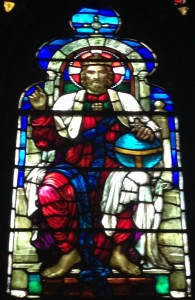 A sermon for November 24, 2019, celebrated as The Last Sunday after Pentecost: Christ the King. The scriptures are Jeremiah 23:1-6, Psalm 46, Colossians 1:11-20, and Luke 23:33-43.
A sermon for November 24, 2019, celebrated as The Last Sunday after Pentecost: Christ the King. The scriptures are Jeremiah 23:1-6, Psalm 46, Colossians 1:11-20, and Luke 23:33-43.
Listen to the sermon HERE.
In the United States, paying attention to the Royal Family in Great Britain can be a little like watching a train wreck or an accident. We have mixed feelings about staring, but find it hard to look away. Just as Harry and Meghan begin to get points for trying to break the mold and do some good things, Prince Andrew comes along and confirms our worst suspicions about inherited privilege.
Royal language can be provocative. For some, it brings a knee-jerk reaction—organize the rebellion, reject all authority. But for others, thinking of royals, conjures up a kind of teary yearning for a realm of someone like King Arthur, or the realm of a Disney princess, full of romance and chivalry, religious sentiment, and niceness.
All the more problematic, then, when we read scripture and celebrate liturgies that speak of God as King, or that speak of Jesus as king.
A little like some reactions to current monarchies, some theologians and preachers rebel against this language. Instead of the “kingdom” of God, they might speak of the “kin-dom” of God, or the commonwealth of God. But to avoid calling Christ “King” is to miss a major point in today’s Gospel. It is to miss a major point in Christian theology.
The image of a king is important because Jesus does so much to deconstruct that image. He turns it inside-out. He re-defines it. As people bring to the idea of “king” their own images and desires, Jesus holds a mirror up so that we might inspect those images more closely, and try to see the one behind the mirror—both our true self, as well as Jesus the Son of God.
At the cross, the soldiers mock Jesus and make fun of him, calling him, “king.” “The king of the Jews,” they name him. “If you’re such a great king, then do something. Show off. Save yourself.” And Jesus is silent. But then one of the thieves who is also on a cross next to Jesus understand something of his kingship and asks for favor. “Jesus, remember me when you come into your kingdom.” The thief can’t really have any idea what he’s asking, or what kind of a king Jesus is, or what kind of a kingdom his may be—but he sees something in Jesus and his way, in his love that forgives, and receives, and leads to the love of God. And so, the thief wants “in.” He asks for entrance, and Jesus gives it.
In this Gospel we see the kind of king Jesus is—that even from the cross, he extends his kingdom and invites everybody in.
The reign of Christ the King is like that—ever unfolding, ever extending, ever including each one of us.
It is a kingdom of reversals. As the Virgin Mary sings, “He has scattered the proud in the imagination of their hearts. He has put down the mighty from their thrones, and exalted those of low degree. He has filled the hungry with good things; and the rich He has sent empty away.” To live with Christ as King is to live with an awareness of this reversal.
His is a kingdom of outcasts. When we read the Gospels, it is a wild array of people who come to hear Jesus, who follow him, and who make him their Lord. Some are prostitutes, some are tax collectors, some widows, some soldiers; some are very rich, some are very poor, but they are unlikely to meet except for their meeting in the presence of Christ. To live with Christ as King is to live in continual welcome of the outcasts, of those who have nowhere else to go.
And finally, his is a kingdom of possibilities. To live with Christ as King is to live in expectation, to live in hope, and to live in faith. It is a kingdom of second chances, and third chances and fourth and fifth and sixth chances.
Even as we might wrestle with our perception of the kings and queens of our day, living in our world, on this Sunday, we can give thanks for Christ the King. We can give thanks he continues to reinterpret the meaning of power, of rule, of authority, as he continually empties himself of those things so that we might be full. And being full, we empty ourselves so that others may be lifted up.
May we rejoice in this kingdom of reversals. May we open our doors to a kingdom of outcasts. And may we open our hearts to a kingdom of possibilities.
In the name of the Father, and of the Son, and of the Holy Spirit. Amen.